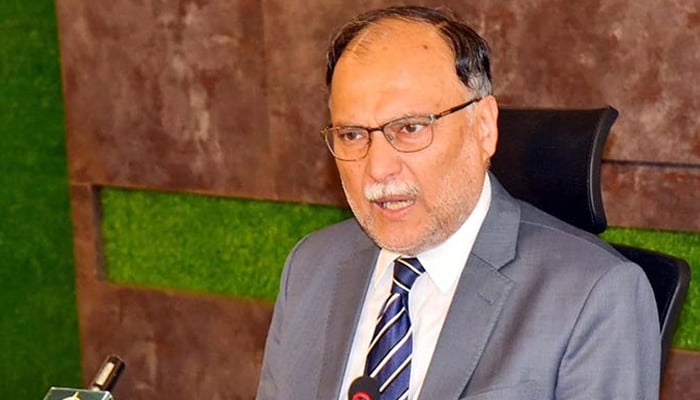Solid footings a must to avoid the nation falling behind
He called for setting aside differences and working collectively for national development, noting that 60% of population is young
LAHORE: The Federal Minister for Planning, Development, and Special Initiatives, Ahsan Iqbal, has emphasised the importance of policy continuity for sustained growth, saying that a solid foundation is crucial to prevent the country from falling behind. Highlighting the current administration’s approach to economic revival, Iqbal identified food and water security, along with climate change, as key areas requiring serious attention to address the nation’s growth challenges.
Speaking as the chief guest at the ‘Public Policy Conference on Food Security’ organised by the National School of Public Policy (NSPP) on Monday, Iqbal stressed that a decade-long continuity of policies is essential for effectively navigating challenges and fostering growth. He outlined four critical pillars for achieving growth: peace, political stability, sustained policy continuity, and commitment to reforms. The minister warned that without concrete and comprehensive measures, the nation risks falling behind in a rapidly evolving world. He also pointed out that Pakistan is blessed with abundant resources, which must be utilised effectively. He called for setting aside differences and working collectively for national development, noting that 60% of the population is young. Empowering both youth and women, he asserted, is key to alleviating poverty, with agriculture remaining the backbone of the economy.
Iqbal identified rapid population growth and climate change as primary challenges. He emphasised the need for modern technology to address these issues and boost production, with the government prioritising food security. He acknowledged the threats to food security posed by global climate change and stressed the importance of preparedness. An estimated $348 billion in investments will be required between 2023 and 2030 to tackle these challenges effectively.
The minister also highlighted the urgency of improving social indicators, many of which are comparable to those of African nations. He underscored the need to address issues such as population growth, illiteracy, poverty, and malnutrition, as sustainable development is impossible without a strong socio-economic foundation. Eradicating social inequality and empowering youth and women are crucial for the nation’s progress.
Discussing the impact of climate change on food security, Iqbal noted that many farmers still rely on traditional practices, leading to reduced yields. Despite Pakistan’s position as a top commodity producer and the third-largest milk producer globally, climate change and other challenges have jeopardised agricultural output. He advocated for the adoption of modern agricultural technologies, which could potentially increase production by up to 200%.
Bureaucrat Naseem Sadiq highlighted the vital role of small farmers in the agriculture sector, noting their significant contribution to national development and growth. He expressed concern over the distress faced by small farmers and called for policies centred on their needs, describing them as the “nucleus” of the farming sector. Sadiq asserted that small farmers could help turn around the economy in the shortest time if given the necessary support.
Khalid Khokhar, President of Pakistan Kissan Itehad (PKI), linked food security directly to national security. He lamented that agricultural policies are rarely implemented and that the government fails to recognise the role of farmers. This year, despite the government setting a support price of Rs3,900 per 40 kg for wheat, farmers were forced to sell at Rs2,200 to Rs2,300 per 40 kg. Khokhar warned of a worsening scenario for wheat cultivation in the future.
Among others, the conference was attended by Dr. Naveed Elahi, Dean of the National Institute of Public Policy; Dr. Ijaz Munir, Rector of the National School of Public Policy; FAO Representative in Pakistan Florence Rolle; former federal secretary Dr. Shujaat Ali; and several other experts, academics, and journalists.
-
 Celine Dion Reveals Music She's Listening To Lately
Celine Dion Reveals Music She's Listening To Lately -
 HR Exec Kristin Cabot To Speak At Crisis PR Conference After Coldplay Incident
HR Exec Kristin Cabot To Speak At Crisis PR Conference After Coldplay Incident -
 Why Travis Kelce Says Taylor Swift Has Made Him 'so Much Better'?
Why Travis Kelce Says Taylor Swift Has Made Him 'so Much Better'? -
 Halle Berry Credits This Hairstyle With Launching Her Acting Career
Halle Berry Credits This Hairstyle With Launching Her Acting Career -
 Hailee Steinfeld Spills Her 'no-phone' Rule With Husband Josh Allen
Hailee Steinfeld Spills Her 'no-phone' Rule With Husband Josh Allen -
 Bowen Yang Gets Honest About Post SNL Life: 'It’s An Adjustment'
Bowen Yang Gets Honest About Post SNL Life: 'It’s An Adjustment' -
 Charlize Theron Delivers Strong Message At 2026 Winter Olympics Opening Ceremony
Charlize Theron Delivers Strong Message At 2026 Winter Olympics Opening Ceremony -
 Lil Jon Reacts To Son Nathan Smith's Death: 'Devastated'
Lil Jon Reacts To Son Nathan Smith's Death: 'Devastated' -
 Bianca Censori Reveals Where She And Kanye West Stand On Having Children Together
Bianca Censori Reveals Where She And Kanye West Stand On Having Children Together -
 Taylor Swift Hypes Olympic Athletes In Surprise Video Message
Taylor Swift Hypes Olympic Athletes In Surprise Video Message -
 Timothy Busfield Charged With Four Counts Of Child Sexual Abuse
Timothy Busfield Charged With Four Counts Of Child Sexual Abuse -
 Amy Schumer Explains Why Her Sudden Photo Surge Is ‘not A Cry For Help’
Amy Schumer Explains Why Her Sudden Photo Surge Is ‘not A Cry For Help’ -
 Kanye West First Contacted Bianca Censori While In Marriage To Kim Kardashian?
Kanye West First Contacted Bianca Censori While In Marriage To Kim Kardashian? -
 Travis Kelce Reveals What His Nieces Really Do When He, Taylor Swift Visit
Travis Kelce Reveals What His Nieces Really Do When He, Taylor Swift Visit -
 Lola Young Makes Career Announcement After Stepping Back From Touring
Lola Young Makes Career Announcement After Stepping Back From Touring -
 Priyanka Chopra Shares Heartfelt Message For Nick Jonas
Priyanka Chopra Shares Heartfelt Message For Nick Jonas




